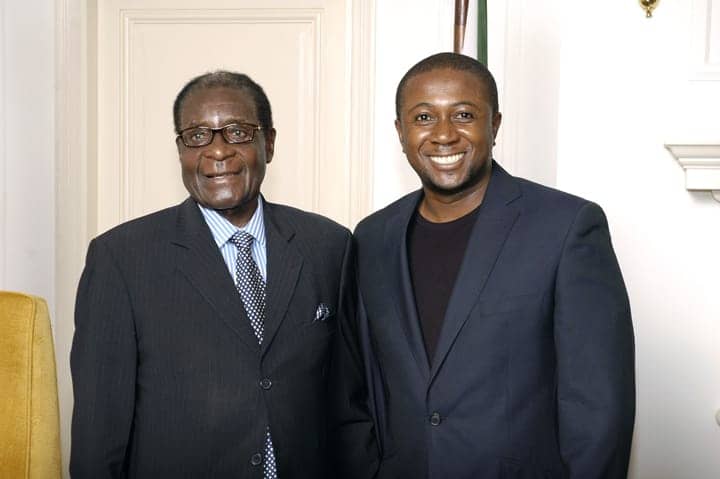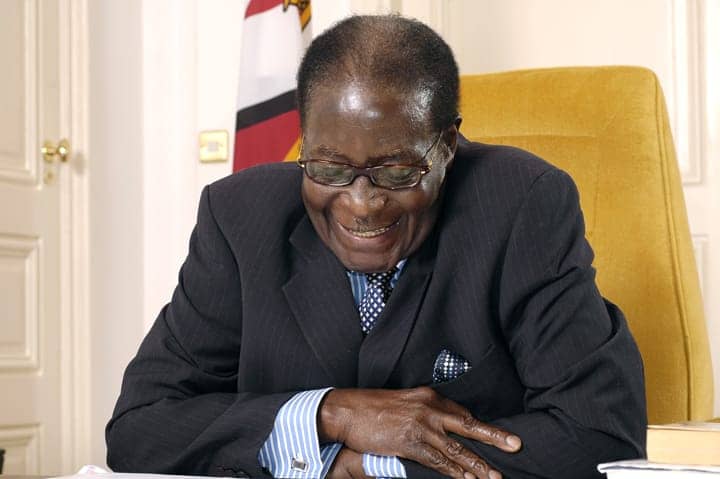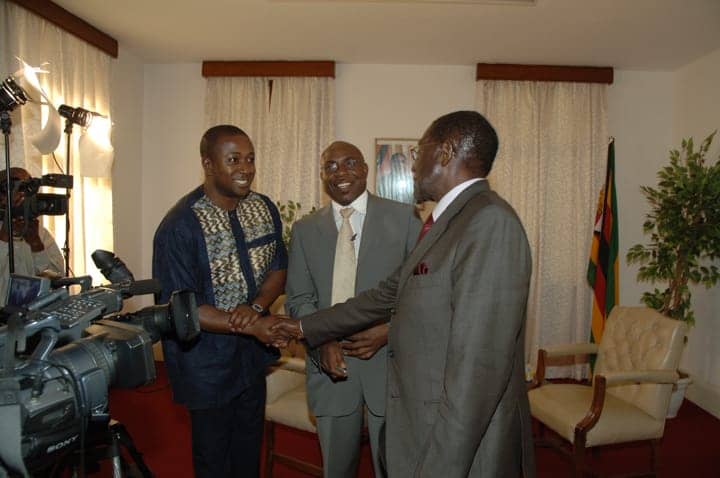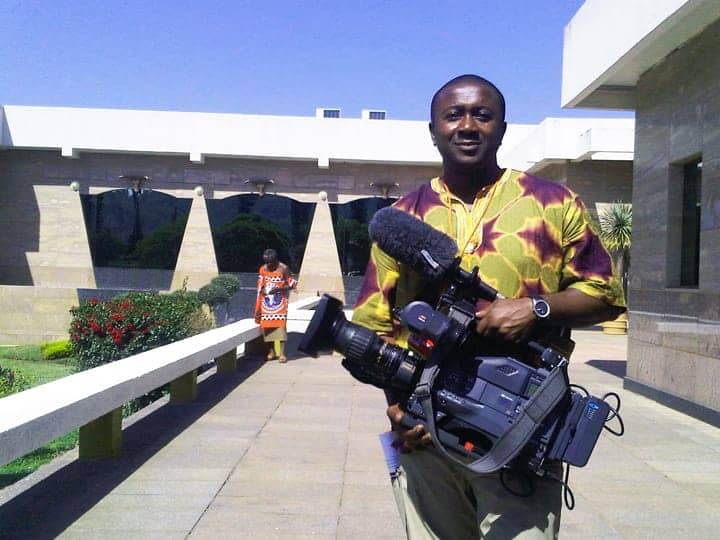by the People’s Minister of Information JR
In the eyes of the international Western media, Robert Mugabe is the most controversial political leader of an African country. The president of Zimbabwe has backed agrarian land reforms that stripped thousands of white farmers, who benefitted from the colonization of the nation, of their land and returned it to the people – to the dismay of Western governments, colonizers and the Western media.
 Roy Agyemang is a Ghanaian filmmaker from London who recently made the documentary film “Mugabe: Hero or Villain?” which is an in-depth look at this man. It recently screened at the Pan African Film Fest and won an award, and it will be screening in the Bay opening night at the Oakland International Film Fest at 6 p.m. on Thursday, April 4, at the Grand Lake Theater in Oakland. Here are a few words with Roy Agyemang, the man behind the lens …
Roy Agyemang is a Ghanaian filmmaker from London who recently made the documentary film “Mugabe: Hero or Villain?” which is an in-depth look at this man. It recently screened at the Pan African Film Fest and won an award, and it will be screening in the Bay opening night at the Oakland International Film Fest at 6 p.m. on Thursday, April 4, at the Grand Lake Theater in Oakland. Here are a few words with Roy Agyemang, the man behind the lens …
M.O.I. JR: When and how did you become a filmmaker? Where were you trained?
Roy A.: I have been working in the media as early as 10 years old. I began in front of the camera as a child actor, then moved into presenting. I was one of the few Black faces on British television.
I trained at Ravensbourne School of Broadcasting in London, developing the skills as a director and cinematographer. Moving behind the camera was a natural progression for me and the best move I made. I had much more control about the stories I was telling.
M.O.I. JR: As a Ghanaian, what made you want to do a film about the revolutionary Zimbabwean President Mugabe?
Roy A.: Growing up in the U.K., the perception of Africa and its leaders had a profound effect on how kids acted towards me in the playground for being of African heritage. So from an early age I wanted to work in the media and show my friends there was more to Africans than being killed by Tarzan.
African politics was often discussed in my household. My parents left Ghana around the time of the coup that saw the ousting of Kwame Nkrumah in 1966. Since then the relationship between African leaders and the West has had its ups and downs. I was fascinated to understand how this often fractured relationship had to do with Africa remaining poor.

M.O.I. JR: How long did it take you to shoot “Mugabe: Hero or Villian”? How did you get access to the top circles of Zimbabwean politics for the film?
Roy A.: I spent three years on the ground in Zimbabwe. It was the most challenging and most rewarding three years of my life. Getting access was extremely difficult. There were those who thought I worked for the British secret service. Others thought I worked for the BBC.
The fact that I stayed on the ground when the country was facing its toughest period economically since independence helped gain the trust of President Mugabe. It took almost two years to get the first interview with the president. I spent the following year travelling around Africa with Mugabe.
M.O.I. JR: What is the importance of this documentary in the scope of contemporary African politics?
Roy A.: Political independence of Africa began in the 1950s; some nations fought a bloody war for their freedom. The war for economic independence of Africa will be an even tougher battle. This film gives you a clear idea of what happens to a country when an African leader attempts to take control of the country’s natural resources.
M.O.I. JR: Since you were on the ground in Zimbabwe, how do you feel about the controversial agrarian reforms of Mugabe? Was this a necessary step for the nation to survive?

Land reform was completely necessary; some criticize Mugabe for taking almost 20 years to do it. Others criticize the methods by which land redistribution policy was implemented.
M.O.I. JR: How have Black people from the U.S. and Europe responded to your film? White people?
Roy A.: The response to my film in the U.S. and Britain has been fantastic, beyond my wildest dreams. My film goes against the grain of the powerful Western media. I get thanked for my objectivity.
After my recent screenings in Los Angeles, people have said to me they were ashamed to be American. They were disgusted with the policy of their government towards a small African country. I was pleased to see many white people in the audience at my screenings in LA. There were many things in the Zimbabwean story that they were not aware of.
M.O.I. JR: As a filmmaker, working with such politically powerful subjects, how do you attempt to keep your objectivity?
Roy A.: The Western view of Zimbabwe and its president has been consistently negative over the last 12 years. It was important for me to listen to the views of Zimbabweans – Black, white, young and old – and get a less sensationalist view of their country. Even those who disagree with Mugabe’s polices are utterly appalled at the Western propaganda about their country.
It was also critical to get the views of African leaders. It makes compelling viewing: the opposing views of African and Western leaders.

Roy A.: The film recently received the Special Recognition Jury Award at the Pan African Film Festival in Los Angeles
M.O.I. JR: Why did you name this film “Mugabe: Hero or Villian”? What is your take on the question?
Roy A.: Mugabe: villain or hero? I live in the U.K., where Mugabe is viewed as a villain. Spending three years on the ground, which also included travelling around Africa, I heard many people state that Mugabe is a hero.
My film is presented in a way where the viewers can make up their own mind.
African leaders that don’t conform to Western ideology are more often than not perceived as villains. It is only when they die that they are remembered as heroes, just like the great Kwame Nkrumah.
M.O.I. JR: How do people keep up with you online?
Roy A.: Twitter: @RoyAgy; Facebook: Roy Agyemang; www.mugabevillainorhero.com
The People’s Minister of Information JR is associate editor of the Bay View, author of “Block Reportin’” and filmmaker of “Operation Small Axe” and “Block Reportin’ 101,” available, along with many more interviews, at www.blockreportradio.com. He also hosts two weekly shows on KPFA 94.1 FM and kpfa.org: The Morning Mix every Wednesday, 8-9 a.m., and The Block Report every other Friday night-Saturday morning, midnight-2 a.m. He can be reached at blockreportradio@gmail.com.





